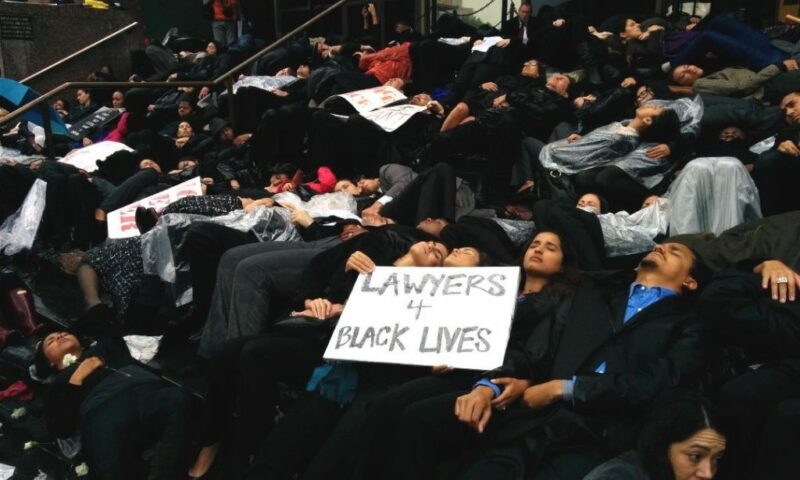I recently interviewed one of the country’s unabashed progressive leaders, New York Mayor Bill de Blasio. Our discussion ranged from Ronald Reagan’s legacy to the failures of contemporary Democrats to stand up for their values. “We have an income inequality crisis in this country that will endanger the future of the entire United States of America,” de Blasio told me. We present here the third in a series of clips from that interview. (Full transcript here.)
Danny is communications director at LAANE and the publisher of Capital and Main. He has led LAANE’s communications efforts for the past decade. He has attracted national media attention for numerous LAANE projects, including the successful effort to stop Wal-Mart from building a superstore in Inglewood and the drive to bring living wages to hotel workers in Santa Monica.
Read more articles by Danny Feingold » Read more about: Watch Now: Bill de Blasio on Progressive Movements in American Cities »


“That can’t be,” Alma Gutierrez said, shaking her head.
“Why not?” Hank Dixon shot back. “It makes money for the university and they get to, you know, what do you call it they do in college … field work, I guess you’d say.”
The two were standing in the laundry room of the Eden Arms. Dixon was installing a new drive belt on one of the dryers. She’d been walking by and he’d called her inside. The handyman continued, “Look, I’m not saying this is for sure, since it comes secondhand.”
“But this man, this gambling friend of your nephew is a lawyer?” The widow Gutierrez didn’t approve of card playing or betting on the horses. Her deceased husband had a gambling habit and more than once had lost the rent money chasing the ponies or doubling down in blackjack.
“Yeah,” Dixon answered while continuing his repair work.
» Read more about: The Dixon Family Chronicles: “Shut Christmas Down!” »
I recently interviewed one of the country’s unabashed progressive leaders, New York Mayor Bill de Blasio. Our discussion ranged from Ronald Reagan’s legacy to the failures of contemporary Democrats to stand up for their values. “We have an income inequality crisis in this country that will endanger the future of the entire United States of America,” de Blasio told me. We present here the second in a series of clips from that interview. (Full transcript here.)
Danny is communications director at LAANE and the publisher of Capital and Main. He has led LAANE’s communications efforts for the past decade. He has attracted national media attention for numerous LAANE projects, including the successful effort to stop Wal-Mart from building a superstore in Inglewood and the drive to bring living wages to hotel workers in Santa Monica.
Read more articles by Danny Feingold » Read more about: Watch Now: Bill de Blasio on the Current Economic Crisis »


Our friend showed up late in the evening from Northern California to spend a couple of days with us before pushing on in a long-planned vacation. But when I woke up the next morning, he had been up for hours. I found him surrounded by three screens and his cell phone – solving a tech problem for his company.
“Auspicious beginning of a vacation,” I said. “I thought you were supposed to leave all that behind.”
“Oh, no,” he said, “not at my pay level.”
And so it goes. “No rest for the weary and the wicked go free.” That was an oft repeated phrase an early mentor in work mumbled as he sipped on yet another cup of coffee and ran to yet another customer. He may have been obsessive and wired, but he only worked a 40-hour week. None of us worked more, except the boss now and then.


Capital & Main recently looked at a spate of negative headlines about public pension funds, spurred by data that State Controller John Chiang released on his new public data site at ByTheNumbers.sco.ca.gov.
Chiang has served as Controller since 2006, acting as California’s Chief Fiscal Officer. He was recently elected as State Treasurer and will switch to that office next year. In both roles, Chiang sits on the Boards of Administration for the two largest public employee funds, California Public Employees’ Retirement System (CalPERS) and the California State Teachers’ Retirement System (CalSTRS).
Capital & Main followed up with the Controller to ask about the state of pension systems in California and how those systems should be looking to the future.
The data you posted on your By the Numbers site led to many existing critics of pension saying “See?
» Read more about: Controller John Chiang on the Future of California’s Public Pensions »
…
California is in the midst of what is arguably the worst drought in its recorded history.
Powered by Cincopa Video Hosting for Business solution.California’s Megadrought in the Central ValleyPictures of land and people in California’s Central Valley impacted by the state’s historic drought.Dead orchards are bulldozed and woodchipped to make into compost.flash 16cameramake Canonheight 600orientation 1camerasoftware Adobe Photoshop CC 2originaldate 10/28/2014 5:34:26 PMwidth 900cameramodel Canon EOS 5D Mark IICitrus grower Bryan Hixson alongside the Friant-Kern Canalflash 16cameramake Canonheight 600orientation 1camerasoftware Adobe Photoshop CC 2originaldate 10/28/2014 12:23:12 AMwidth 900cameramodel Canon EOS 5D Mark IIAlmond husks. Almonds are highly water-intensive, but growers are holding onto their almond fields and even switching over to the crop because it yields among the highest profit margins.flash 16cameramake Canonheight 600orientation 1camerasoftware Adobe Photoshop CC 2originaldate 10/28/2014 7:10:32 PMwidth 900cameramodel Canon EOS 5D Mark IIBoth the high-speed rail and the effort to restore the San Joaquin salmon run are political third rails in the Central Valley.flash 16cameramake Canonheight 600orientation 1camerasoftware Adobe Photoshop CC 2originaldate 11/6/2014 12:00:38 AMwidth 900cameramodel Canon EOS 5D Mark IICitrus grower Gus Carranza in his fieldsflash 16cameramake Canonheight 600orientation 1camerasoftware Adobe Photoshop CC 2originaldate 10/27/2014 8:13:52 PMwidth 900cameramodel Canon EOS 5D Mark IICalifornia’s Proposition 1 was an emergency measure to mitigate the drought situation,


“Racism doesn’t take a break when it rains and neither will we,” Priscilla Ocen, a professor at Loyola Law School, announced over a loudspeaker outside the Stanley Mosk Courthouse in downtown Los Angeles Tuesday. Before her stood a crowd of about 200 people, mostly lawyers and law students, who braved a downpour to protest state violence from South L.A. to New York City, culminating in a four-minute-and-thirty-second “die-in” — representing the four-and-a-half hours that police in Ferguson, Missouri, let Michael Brown’s dead body lie in a street.
“I think it’s a really important thing to stand up to the injustice that we’re seeing around the country,” said Mona Iman, director of Taslimi Foundation, which works to defend human rights in Iran. “This wave of killings of unarmed black men is just so disturbing,” she told me, “and when you feel the frustration and you feel the anger at what’s happening in the world,
» Read more about: Lawyers and Law Students Stage ‘Die-in’ Outside L.A. Courthouse »


“Ain’t that about nothing,” Macy Farmdale said. “Nine to zip, including the so-called liberals.” She shook her head. “What chance does the working woman have, I ask you.”
Jess Dixon said, “It’s all about keeping the big conveyor belt going, Macy. Us peasants have no choice but to fight and scrabble each day for our rice and beans.”
“Sheeet,” her friend sneered.
The two chuckled mirthlessly. They lamented the recent Supreme Court ruling wherein employees were expected to go through their end of shift security screenings on their own time—no matter if it took five minutes or half an hour.
Farmdale leaned across the lunch table toward the other woman. “This is why we need a union,” she whispered. She leaned back and had more of her chicken salad sandwich.
Jess hunched her shoulders. “That wouldn’t change the ruling. I bet them unions filed, you know,
» Read more about: The Dixon Family Chronicles: “The People United” »


What do Facebook, Kaiser Permanente, Staples and the San Francisco Department of Environment have in common? All four appear on a list of corporate and government entities that pledged to stop purchasing furniture treated with flame-retardant chemicals. The Center for Environmental Health (CEH), the organization behind the pledge, hopes to steer business away from furniture containing flame retardants, which have been linked to a range of health risks. All the offices on the list spend a combined $520 million on furniture every year.
The pledge coincides with new state legislation that will require manufacturers to attach labels to furniture treated with flame retardants. In September Governor Jerry Brown signed Senate Bill 1019, which takes effect January 1, 2015.
Treating furniture with flame-retardant chemicals used to be standard procedure for meeting California’s furniture flammability code, known as Technical Bulletin 117.
“For a long time government regulations were promoting the use of these chemicals,” Charles Margulis of CEH tells Capital &
» Read more about: Offices Pledge They’ll Buy Chemical-Free Furniture »